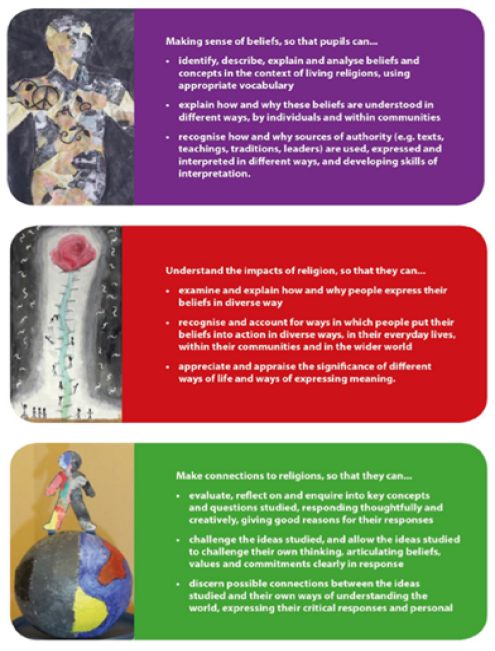R.E.
At St Martin’s, Religious Education is at the heart of our curriculum and Christian ethos. Our intent is to nurture every child’s spiritual development, understanding of faith, and respect for others through a rich and inclusive RE curriculum. We aim to help pupils grow into thoughtful, compassionate individuals who know they are loved, valued, and capable of making a positive difference in the world.
Using Understanding Christianity and the Sandwell SACRE Agreed Syllabus, we provide a curriculum that:
-
Deepens pupils’ knowledge of Christian theology and its relevance to everyday life.
-
Celebrates diversity by exploring world religions and non-religious worldviews with empathy and curiosity.
-
Encourages children to reflect on their own beliefs and values, and to appreciate those of others.
-
Supports pupils in asking big questions about life, meaning, and morality in a safe and respectful space.
Our RE curriculum reflects our vision: that every child belongs, is loved equally, and is celebrated for the unique gifts God has given them.
Through our FRESH values, we create a harmonious community where pupils are inspired to love God, love themselves, and love one another.
We find our strength and motivation through our faith, knowing that: “I can do all things through Christ who gives me strength.” – Philippians 4:13
Parents/carers have the legal right to withdraw their child from all or part of RE lessons. If you are considering this, we encourage you to speak with the Headteacher to discuss your concerns and explore how we can support your child’s education in line with your wishes.
Big Ideas
Religious Education at our school is rooted in the belief that understanding different faiths and worldviews helps pupils make sense of the world and their place within it. Through the Understanding Christianity scheme and The Sandwell Agreed Syllabus for Religious Education, we aim to develop pupils’ thinking, values, and sense of identity, while promoting respect, tolerance, and reflection on life’s big questions.
Content
Our curriculum combines the depth of Christian belief and practice with a broad exploration of global religions and philosophies. Pupils gain systematic knowledge of a range of faiths, enabling them to engage meaningfully with diverse perspectives and develop their own informed views. The curriculum also supports Spiritual, Moral, Social and Cultural development and reinforces British Values.
Sequencing
RE is carefully sequenced across year groups to ensure progression and coherence. The Understanding Christianity framework builds pupils’ understanding of Christian concepts over time, while the Sandwell syllabus outlines knowledge and teaching from other faiths. This structured approach ensures high standards of learning and supports all pupils in reaching their full potential.
Oracy and Vocabulary
In Religious Education, oracy and vocabulary play a vital role in helping pupils express their ideas clearly and confidently. Through structured discussions, debates, and reflective conversations, children learn to articulate their thoughts on complex topics such as belief, morality, and identity. We actively teach subject-specific vocabulary to deepen understanding and encourage precise communication. This focus on language empowers pupils to engage respectfully with diverse viewpoints, ask thoughtful questions, and contribute meaningfully to discussions about religion and the wider world.
Assessment

Reasonable Adjustments for pupils with SEND
Learning objectives and opportunities in RE for pupils with SEND are Specific, Measurable, Achievable, Relevant, Time-related. The learning objectives should be pitched at an appropriate level for each child and should show how pupils might demonstrate what they have experienced and or learned by doing each planned activity. The RE outcomes can be used to review progress and check whether pupils need more support or challenge. They also provide a framework for giving feedback to pupils.
Lessons are designed to be inclusive and flexible, allowing pupils to participate in discussions, activities, and reflections. Our aim is to create a respectful and supportive environment where every child can explore beliefs, share their ideas, and develop a sense of identity and belonging.
